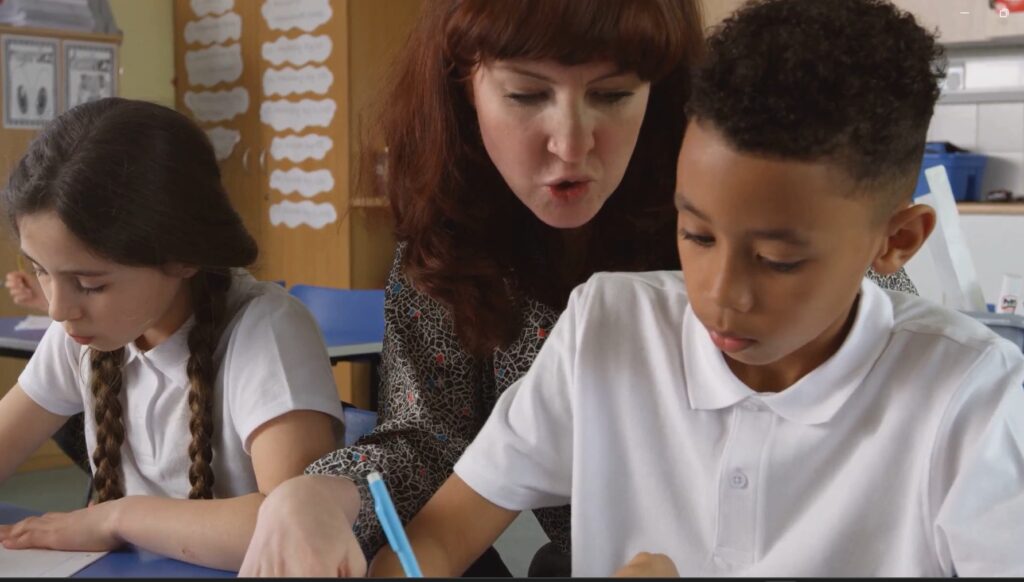Teacher feedback that gives students options can make them feel empowered
Complete the gaps in the article extract with the words in bold below:
recipient elaborate capacity sufficient disempowering
support guidance rise to the occasion prescriptions thrive
“Give a man a fish, and you feed him for a day. Teach a man to fish, and you feed him for a lifetime.” This proverb has become a cliché, but it remains a useful shorthand for self-sufficiency. If you want someone to succeed independently, give them the tools to do so.
Within the realm of education, this principle can inform the ways that teachers give feedback. For instance, it is often easier and quicker for educators to simply correct a student’s work. But this approach can take away a student’s opportunity to learn, grow and demonstrate that they can 1. ………….. . Indeed, what we often miss about “teaching a man to fish” is that this approach also communicates the teacher’s belief that the proverbial man can succeed at fishing. By giving feedback that allows someone to do the work themselves, you signal your expectation that they have the 2. ……….. to do it.
In a 2023 study, education professor Lisel Murdock-Perriera of Sonoma State University, psychologist Jennifer Eberhardt of Stanford University and I examined how feedback in the classroom can 3. ………. student learning. That question is long-standing, but we explored a new dimension of feedback: agency. In this context, agency is the sense of control and freedom someone has when responding to a teacher’s comments. In what we call agentic feedback, teachers provide opportunities for students to independently revise their work, making the student an active partner in the revision process rather than a passive 4. ………. of feedback. My colleagues and I argue that this approach can help kids 5. ………….. academically—and may be especially powerful for children from marginalized backgrounds. In fact, agentic feedback could be a key to improving equity and outcomes in many contexts, from the classroom to the boardroom. (…)
Another powerful benefit of agentic feedback is that it is not merely built on encouragement or praise. Although supportive language can complement agentic feedback, it should not be the only feedback given. This distinction is important because it relates to an effect in psychology known as the positive feedback bias: teachers tend to give Black students more positive and less critical feedback than they give to the students’ white peers. Receiving only praise can be 6. ………….. because it limits the potential for learning and growth.
Relatedly, agentic feedback can include criticism, but it scaffolds critique with information to support next steps. For instance, when a teacher writes, “This part of your presentation is a little unclear,” they are offering a critique. They can then follow with 7. ………., such as “Start this section with a plain-language summary of what you want to say and then 8. ………. on it.” This is agentic feedback.
Our research involved middle and high school teachers responding to student writing. But the lessons learned can apply to many contexts, including the interactions between a manager and their employee. People want to feel like someone believes in them and is there to support them. Agentic feedback provides one way to achieve both goals. The key to providing this feedback is to think about the questions you can raise rather than issuing direct corrections or 9. ……… . It’s the difference between telling someone how they should do it and asking, “How could you approach this issue differently in the future?”
Agentic feedback is not revolutionary. It uses skills and concepts you may already have in your arsenal: giving advice rather than prescriptions; asking questions rather than correcting; and affirming while providing guidance. (…) Whether in the classroom or in the office, “teaching someone to fish” with agentic feedback not only helps people become more self-10. ………. but also helps them believe in their potential to learn.
In order to read the whole article/check your answers, go to: https://www.scientificamerican.com/article/useful-feedback-more-than-praise-helps-students-flourish/
Key: rise to the occasion; 2. capacity; 3. support; 4. recipient; 5. thrive; 6. disempowering; 7. guidance; 8. elaborate; 9. prescriptions; 10. Sufficient
Glossary
- to scaffold – to support by means of a scaffold (= a temporary raised platform on which workers stand to paint, repair, or build high parts of a building)
Practice makes perfect
WORD FORMATION: Change the word in CAPITALS to fill in the blanks.
(…) so the classroom starts to feel a little bit small. So we found an 1. ………. [INDUSTRY] site in Hong Kong, and we turned it into the largest mecaspace focused on 2. ………. [SOCIETY] and environmental impact.
It’s in central Hong Kong, and it’s a place where you can work with wood, metal, chemistry, a bit of biology, a bit of optics. Basically, you could build pretty much everything there. And it’s a place where adults and kids can play together.
It’s a place where kids’ dreams can come true with the help of adults, and where adults can be kids again. We’re asking questions such as, can we invent the future of 3. ………. [MOBILE] with 4. …………… [RENEW] energies, for example? Or can we help the mobility of the ageing 5. …………. [POPULATE] by transforming very standard wheelchairs into cool electric vehicles? So plastic, oil and 6. ………… [RADIOACTIVE] are horrible, horrible legacies, but the very worst legacy that we can leave our children are lies. We can no longer afford to shield the kids from the ugly 7. …….. [TRUE], because we need their 8. ……….. [IMAGINE] to invent the 9. …………s (SOLVE].
So citizen scientists, makers, dreamers, we must prepare the next generation that cares about the environment and people, and that can actually do something about it. Thank you.
In order to check your answers, go to (8:15-9:48):
Key: 1. industrial; 2. social; 3. mobility; 4. renewable; 5. population; 6. radioactivity; 7. truth; 8. imagination; 9. solutions
Discuss
- How can feedback simultaneously communicate expectations and belief in a student’s potential?
- Do you think students always prefer agentic feedback, even though it usually means more work for them? Why or why not?
- Can you think of an example from your own experience (as a student, teacher, or professional) when you received “agentic feedback”? How did it affect you?
- What are some strategies teachers or managers could use to make feedback more agentic without overwhelming learners?
- In the video, the teacher fosters a love for science by making kids active participants in discovery. How is this similar to the concept of agentic feedback?
- Both the text and video suggest that effective teaching is less about giving answers and more about empowering learners. Do you agree? Why or why not?
- Beyond the classroom, how might agentic feedback shape relationships between mentors and mentees, or managers and employees?
- If you were to apply the principle of “teaching someone to fish” in your own life, what context comes to mind first?
Watch and Revise!
Empower Students with Feedback
More Than Just Praise
https://www.cloud.worldwideschool.pl/index.php/s/KTQMcsikBk75jJX
(6327)






